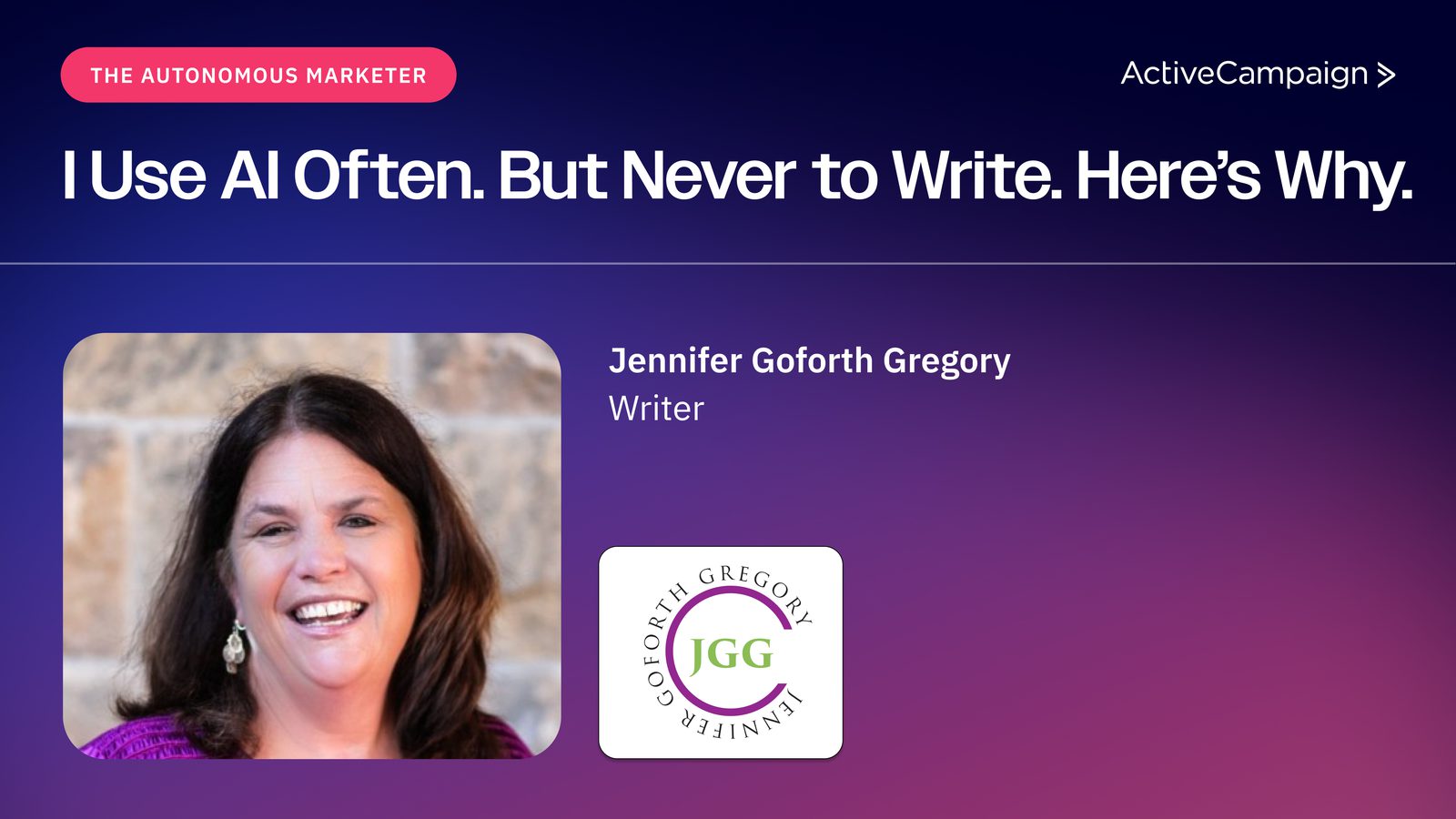Online learning platforms offer a wide range of features that enable us to learn or share our knowledge with the world.
If you're a learner, these platforms offer flexibility and a wide range of courses that allow you to study on your own time, advance at your own pace, and fold relevant courses into your busy schedule. For instructors, these platforms provide the ability to reach a global audience and share your expertise with students from all over the world.
Creators of every niche and topic use online course platforms to not only build courses and establish themselves as sources of truth but also monetize their expertise. But there are a lot of platforms out there for you to choose from.
In this article, we'll take a look at the eight best online learning platforms, their features, pricing, and how they stack up against other tools. You'll come out the other side with a better idea of which platform will work for you and be ready to trial a few to make your final decision.
What is an online learning platform?
An online learning platform is a digital space where you can take a wide range of courses from anywhere with an internet connection. These platforms offer video lectures, interactive activities, and assessments, making it easy to learn new skills or deepen your knowledge at your own pace.
Popular examples include Coursera, Udemy, and Thinkific. They provide the flexibility to fit learning into your schedule and often offer certificates to showcase your achievements.
Many working professionals use these platforms to further their education in specific work-related topics like learning to use new software, management and leadership skills, practical skills, and more. It's not uncommon to see these courses taught by experts within that niche. Because of this, the learner will leave with a much deeper understanding of the topic and, depending on the topic, can use that information in their daily, creative, or professional lives.
In this article, we're taking a look at how online learning platforms can be used by both students and instructors alike.
Key features of an online learning platform for students
An online learning platform for students typically offers several key features. Depending on whether you're a student or teacher, you'll want to look out for different features as you choose a platform.
Students should look for these features when looking for an online learning platform:
- Course variety: Look for platforms that offer a wide range of subjects and individual courses, from academic disciplines to professional skills and personal development.
- Video lectures and interactive content: Look for high-quality video lessons that provide clear and engaging instruction on various topics. Plus, good online learning platforms allow for quizzes, assignments, and interactive activities to reinforce learning and ensure comprehension.
- Flexibility: Any good online learning platform will allow you to learn at your own pace and access course materials anytime, anywhere.
- Discussion forums: Look for community features like discussion boards or chat rooms where you, as the student, can interact, ask questions, and collaborate with your peers.
- Progress tracking: You want to keep track of how you're doing in the class, right? Look for platforms that offer tools to track learning progress, manage your schedule, and set personal goals.
- Certifications: Not every class will offer certifications, but the learning platform you choose should at least offer the opportunity to earn certificates or badges from courses that do. These certifications can then be added to your resume or professional profile.
- Personalization: Good platforms will recommend and personalize your learning path based on your unique individual preferences and performance.
- Support resources: Finally, you should have access to additional learning resources, such as e-books, articles, and tutorials, as well as technical and academic support.
Key features of an online learning platform for instructors
If you're an instructor, you'll want to look for a few different features so the online platform you choose can support your courses and everything you'd like to accomplish with them. Whether you're teaching a live class or a pre-recorded session, there are some basic features the platform you choose should have.
For instructors, online learning platforms should offer:
- Interactive user interface: The platform you choose should be easy to use even for the most beginner instructor (and learner, too!). Your overall experience when using the tool should be seamless, easy, and work well when accessed from other devices like smartphones, laptops, and tablets. This can increase the number of students who tune in from the device of their choice. Finally, you'll want to look for a platform that offers interactivity like quizzes, polls, discussion rooms, and more. The more interactive you can make your courses, the more engaged your students will be.
- A way to facilitate timely feedback: Your students will learn faster when given feedback on topics they may not fully understand yet. Feedback helps you as the instructor praise learners who demonstrate that they understand the topic well and offer guidance to the students who may need a bit more help. This shows your students you care about their success and will likely keep them around longer. When selecting a platform, look for features like survey forms and discussion forums.
- Data backup and storage: If you're spending hours, days, or weeks creating your online course, you'll absolutely need a platform that has a strong stance on data security, backup, and storage. You'll have peace of mind that your course won't vanish into thin air from a glitch or error you can't control.
- Class management: A good online learning platform will make things like communicating with students, managing enrollment, and tracking your students' progress easy. When selecting a platform, look for management and admin features so this part of online course creation isn't a headache. This includes features like enrollment management, learning analytics for each course, course scheduling, automated grading, and more.
The 8 best online learning platforms
Now that we've outlined what online learning platforms should offer and the features you should look for as a student or instructor, let's take a look at the top eight learning platforms. This breakdown will help you understand which platform will suit you best based on your unique needs.
Here's our list of the best online learning platforms:
• Thinkific
• Teachable
• MasterClass
• Demio
• Coursera
• Udemy
• Skillshare
• Kajabi
Thinkific
Thinkific is an online learning platform that enables individuals and organizations to create, market, and sell their own courses. It offers a user-friendly interface for building and managing courses, as well as tools for engaging with students and tracking their progress.
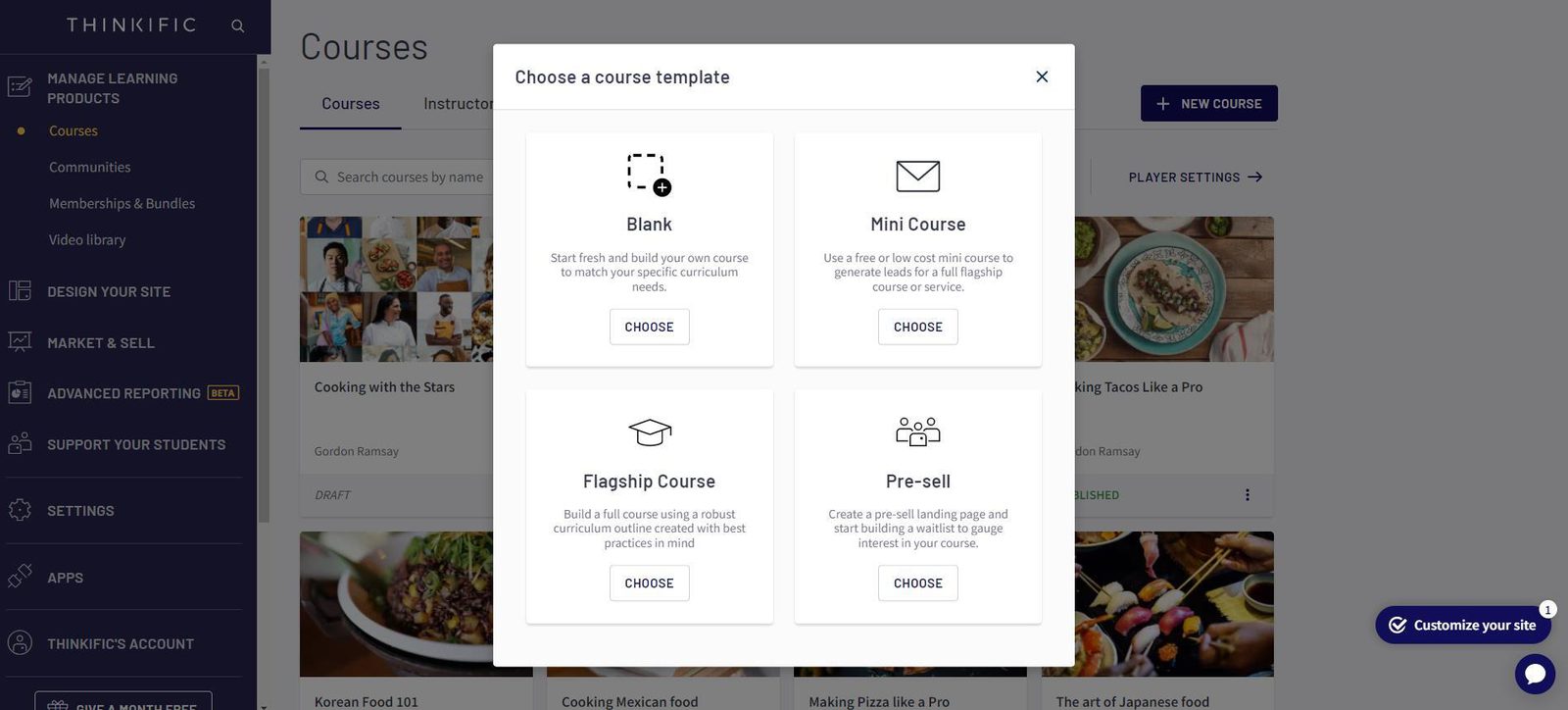
Thinkific supports a variety of multimedia content, making it versatile for different types of educational experiences.
Pros of Thinkific:
• User-friendly course creation tools
• Customizable course designs
• Integration with various marketing and sales tools
• Strong student engagement features
• Comprehensive analytics and reporting
Cons of Thinkific:
• Limited design flexibility compared to some competitors
• Can be pricey for advanced features
• Learning curve for new users
• Dependence on third-party integrations for some functionalities
How much does Thinkific cost for students?
Thinkific offers a free plan that allows users to create and sell up to three courses, making it accessible for beginners and small-scale educators. Their paid plans start at $49/month, billed annually, which include additional features like unlimited courses, advanced customization options, and enhanced marketing tools.
How much does Thinkific cost for course creators?
Thinkific provides course creators with various pricing plans tailored to their needs. The basic plan starts at $49 per month when billed annually, offering features like unlimited courses, quizzes and surveys, and basic integrations with marketing tools. Higher-tier plans, such as the Pro plan at $99 per month, include additional features such as advanced integrations, certificates, and priority support.
Thinkific does not charge transaction fees on course sales, allowing creators to keep more of their revenue. This pricing flexibility enables educators and businesses to choose a plan that suits their requirements and scale their online course offerings efficiently.
Growing your course audience with Thinkific and ActiveCampaign
When you connect ActiveCampaign to your Thinkific account, you can begin growing your audience and automating communications with your students.
With ActiveCampaign and Thinkific, you can:
- Create beautifully branded course marketing emails
- Trigger personalized emails based on actions in Thinkific
- Automate the process for creating and updating contacts
Discover more education apps that integrate with ActiveCampaign here.
Teachable
Teachable is an online learning platform that allows educators to create, market, and sell their courses with ease. It offers intuitive course creation tools and various multimedia support, enabling instructors to deliver engaging educational content.
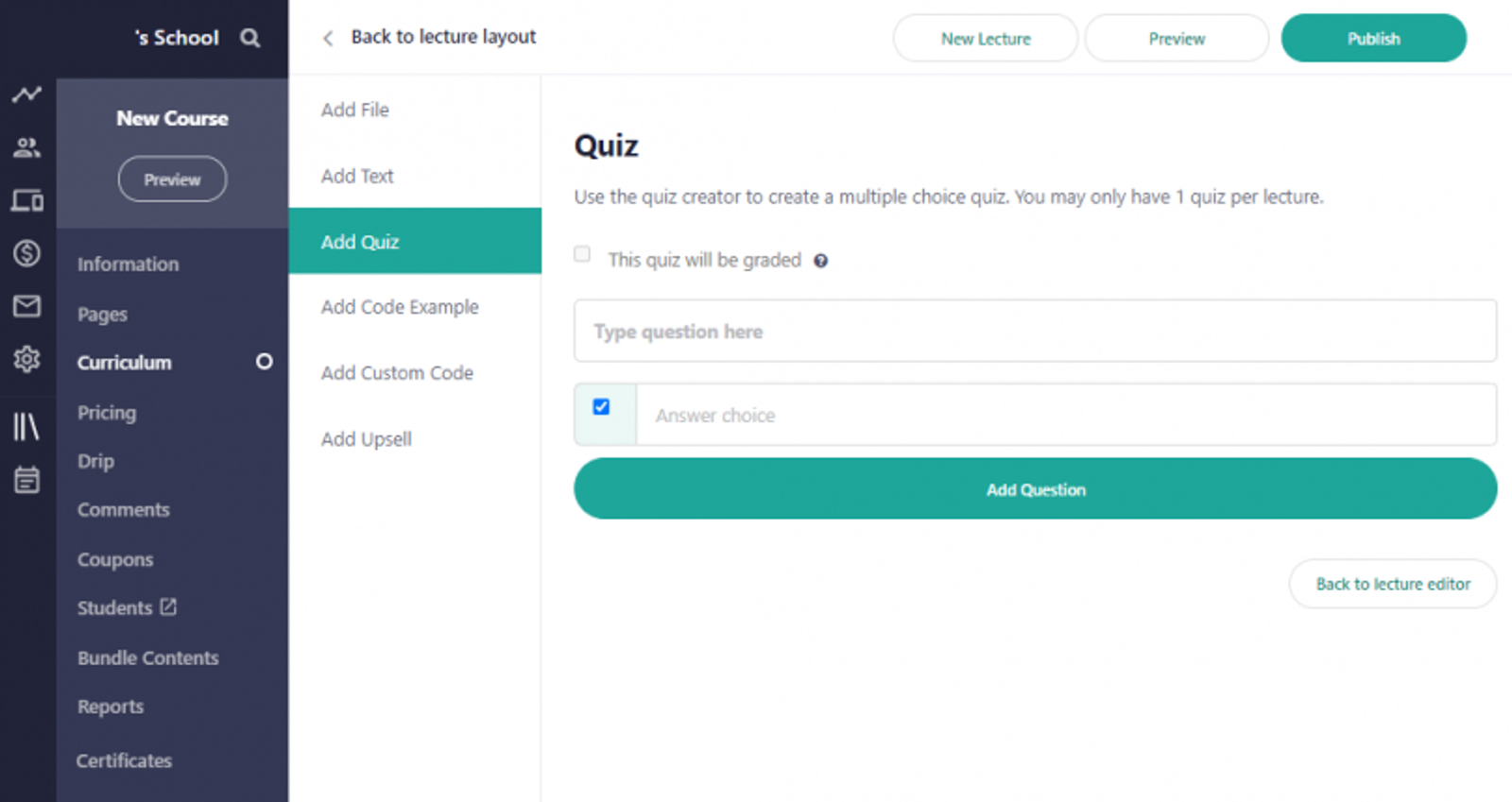
Teachable also provides robust features for student management and performance tracking, making it a comprehensive solution for online education.
Pros of Teachable:
• Easy-to-use course creation tools
• Support for various multimedia formats
• Integrated payment processing
• Comprehensive student management features
• Customizable branding options
Cons of Teachable:
• Transaction fees on lower-tier plans
• Limited design customization
• Can be expensive for advanced features
• Occasional technical glitches reported by users
How much does Teachable cost for students?
Teachable offers a free plan with limited features, allowing new users to get started without any upfront costs. Their paid plans begin at $39 per month (billed annually), which includes additional benefits such as unlimited courses and students, no transaction fees, and advanced customization options. This entry-level pricing makes it accessible for educators looking to grow their online course offerings while maintaining control over their brand and revenue.
How much does Teachable cost for course creators?
Teachable offers a range of pricing plans for course creators based on their needs and business goals. The basic plan starts at $39 per month when billed annually, which includes essential features like unlimited students and courses, instant payouts, and basic quizzes and assessments. Higher-tier plans, such as the Professional plan at $119 per month, offer additional benefits like graded quizzes, advanced customization options, and integrated affiliate marketing.
Teachable also charges a transaction fee on sales for its lower-tier plans, while higher-tier plans eliminate this fee.
Creating custom student experiences with Teachable and ActiveCampaign
With ActiveCampaign integrated into Teachable, you can do a number of things that will enhance how you engage your students.
This includes:
- Building custom email funnels, workflows, and automations for your students
- Creating custom student onboarding to ensure students stay engaged with your online courses and digital products
- Crafting upselling email funnels for students who have completed a course to increase your revenue and sell more products
Discover more education apps that integrate with ActiveCampaign here.
MasterClass
MasterClass is an online learning platform that features courses taught by world-renowned experts in various fields, including arts, sports, business, and cooking. The platform offers high-quality video lessons and exclusive insights from celebrities and industry leaders.
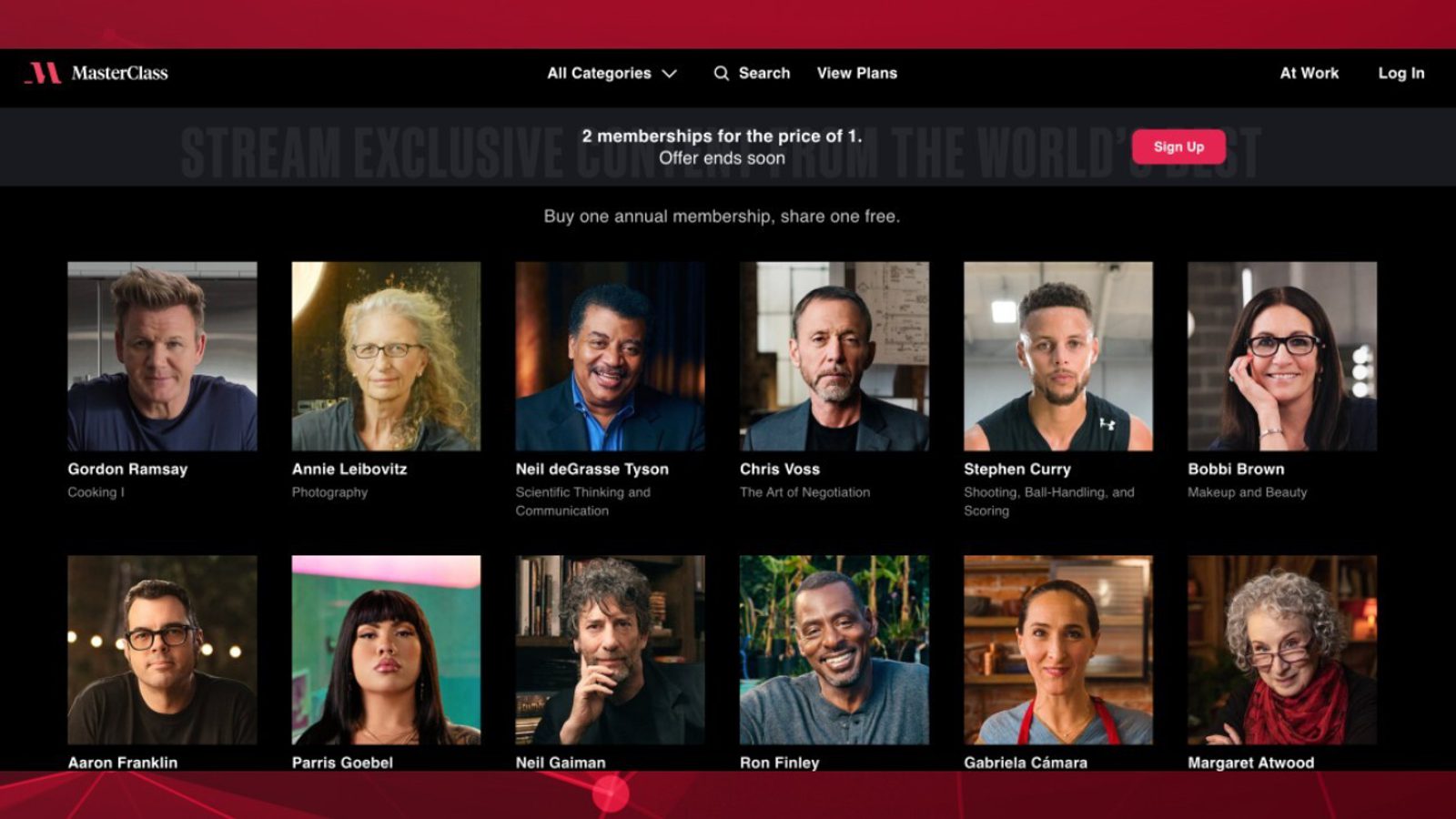
MasterClass is designed to provide an inspiring and engaging learning experience through personal stories and practical advice from the best in the world.
Pros of MasterClass:
• Taught by celebrities and industry leaders
• High-quality video production
• Access to exclusive content and behind-the-scenes insights
• Wide range of topics and fields
• Engaging and inspiring teaching style
Cons of MasterClass:
• Limited interactive or hands-on learning
• Courses may be more inspirational than deeply instructional
• No certification or formal accreditation
• Higher cost compared to other online learning platforms
• Limited depth in certain subjects
How much does MasterClass cost for students?
MasterClass operates on a subscription model, with an annual membership fee of $120, which provides unlimited access to all courses on the platform. This pricing allows users to explore a vast array of subjects and learn from various experts, making it ideal for those seeking inspiration and insights from top professionals across different fields.
How much does MasterClass cost for course creators?
Unfortunately, MasterClass does not offer a platform for individual course creators to upload or sell their courses. Instead, it features courses created in collaboration with renowned experts and celebrities in various fields, which MasterClass itself professionally produces. The content on MasterClass is exclusively curated and made in-house, meaning independent educators cannot directly create or monetize their courses on this platform.
Therefore, no pricing structure is available for individual course creators on MasterClass.
Demio
Demio is a webinar platform designed for businesses and educators to host live, interactive online events and presentations. It offers features like real-time streaming, audience engagement tools, and detailed analytics to enhance the webinar experience.
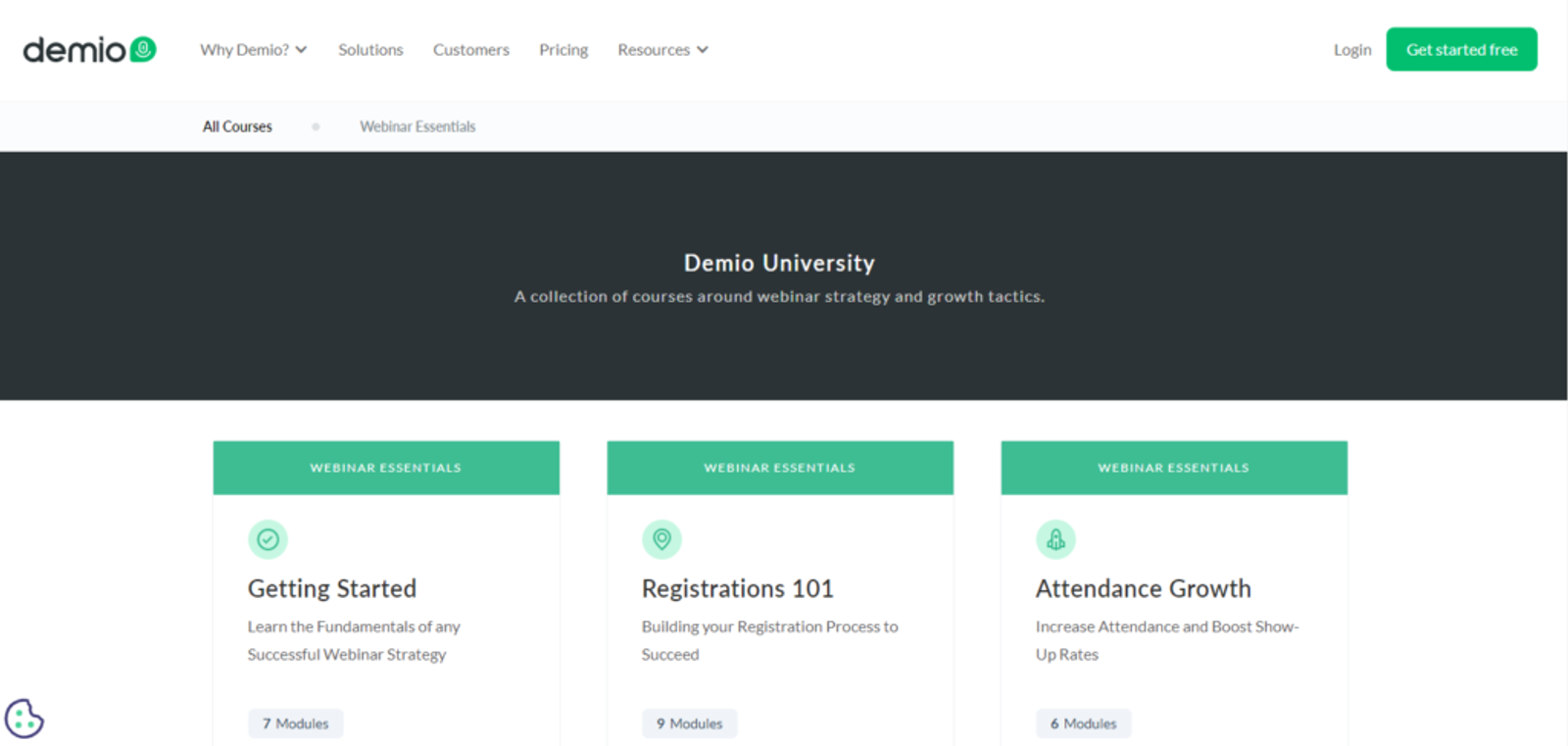
Demio aims to provide a seamless and user-friendly environment for conducting professional webinars and virtual meetings.
Pros of Demio:
• User-friendly interface with easy setup
• Real-time streaming with high-quality video and audio
• Robust audience engagement tools, such as polls and Q&A
• Comprehensive analytics and reporting
• Integration with various marketing and CRM tools
• Automated and on-demand webinar options
Cons of Demio:
• Limited customization options for branding
• Higher pricing compared to some competitors
• Occasional connectivity issues reported
• No built-in e-commerce features
• Limited functionality in lower-tier plans
How much does Demio cost for students?
Demio's entry-level plan starts at $42 per month (billed annually), which includes features such as standard support, up to 50 attendees per webinar, and core engagement tools like polls and Q&A. This plan is suitable for small businesses and educators needing a reliable platform for hosting interactive webinars without extensive customization or advanced features.
How much does Demio cost for course creators?
Demio offers several pricing plans for course creators based on the number of attendees and features required. The entry-level plan starts at $49 per month, which includes up to 50 attendees per webinar, standard support, and essential engagement tools such as polls and Q&A. Higher-tier plans offer additional benefits like increased attendee limits, automated webinars, and advanced analytics, providing more flexibility and functionality for larger-scale or more complex webinar needs.
This tiered pricing structure allows course creators to choose a plan that best fits their budget and requirements while leveraging Demio's user-friendly platform to deliver engaging online courses and presentations.
Run more effective webinars with Demio and ActiveCampaign
When you connect ActiveCampaign to your Demio account, you're able to run more effective marketing and sales webinars with much less work on your end. By fitting seamlessly with ActiveCampaign's automation, you can use Demio to engage prospects and customers in real-time while also measuring results across your campaigns.
With this integration, you'll be able to:
- Automatically capture new leads who register for events in ActiveCampaign
- Tag new contacts in ActiveCampaign automatically based on the events they register for
- Effectively trigger pre-webinar automated campaigns before the event begins
- Save contact details for the webinar, like upcoming attendee join links or custom fields, and map them directly to ActiveCampaign custom fields
- Update your contacts based on their actions on the webinars, like attended or did not attend
- Use the ActiveCampaign 1-click registration link to automatically register users who click a link directly into an upcoming Demio event
Discover more education apps that integrate with ActiveCampaign here.
Coursera
Coursera is an online learning platform that partners with universities and organizations to offer courses, specializations, and degrees in a variety of subjects. It enhances the learning experience with high-quality video lectures, interactive assignments, and peer-reviewed assessments.
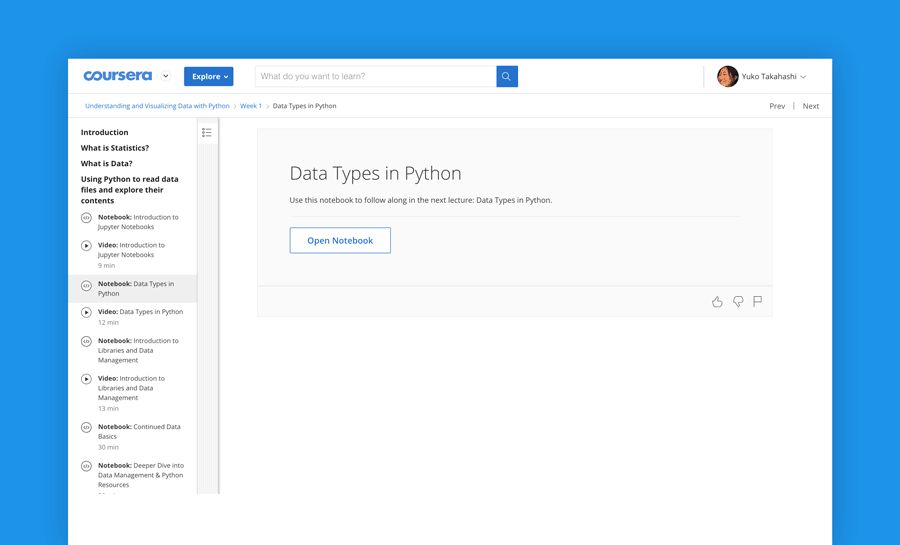
Coursera aims to make education accessible to anyone, anywhere, with many courses available for free or at a low cost.
Pros of Coursera:
• Courses from top universities and organizations
• Wide range of subjects and specializations
• Interactive assignments and peer-reviewed assessments
• Certificates and degrees upon completion
• Free courses and financial aid options available
Cons of Coursera:
• Some courses can be expensive without financial aid
• Varying quality of course content and instructors
• Limited interaction with instructors and peers
• Certificate credibility may vary by employer
• Can be overwhelming due to the vast number of courses available
How much does Coursera cost for students?
Coursera offers many courses for free, providing access to video lectures and some assignments. For those seeking certificates, specialization tracks, or degrees, prices start at $49 per month for access to individual courses, while full degrees can cost significantly more. This pricing structure makes Coursera accessible for learners with different needs and budgets, allowing for both casual learning and formal education pursuits.
How much does Coursera cost for course creators?
For course creators, Coursera offers an opportunity to partner with the platform, typically involving a revenue-sharing model rather than a direct entry-level pricing structure. Course creators work with Coursera to design and deliver high-quality courses, with Coursera providing support in areas such as course development, marketing, and student engagement.
In exchange, Coursera takes a percentage of the revenue generated from course enrollments. This model allows educators and institutions to reach a global audience without upfront costs while benefiting from Coursera's established infrastructure and expertise in online education.
Udemy
Udemy is an online learning platform that offers a wide array of courses taught by instructors from around the world. It provides video-based lectures, quizzes, and assignments across diverse subjects, from technical skills like programming to personal development topics such as photography or mindfulness.
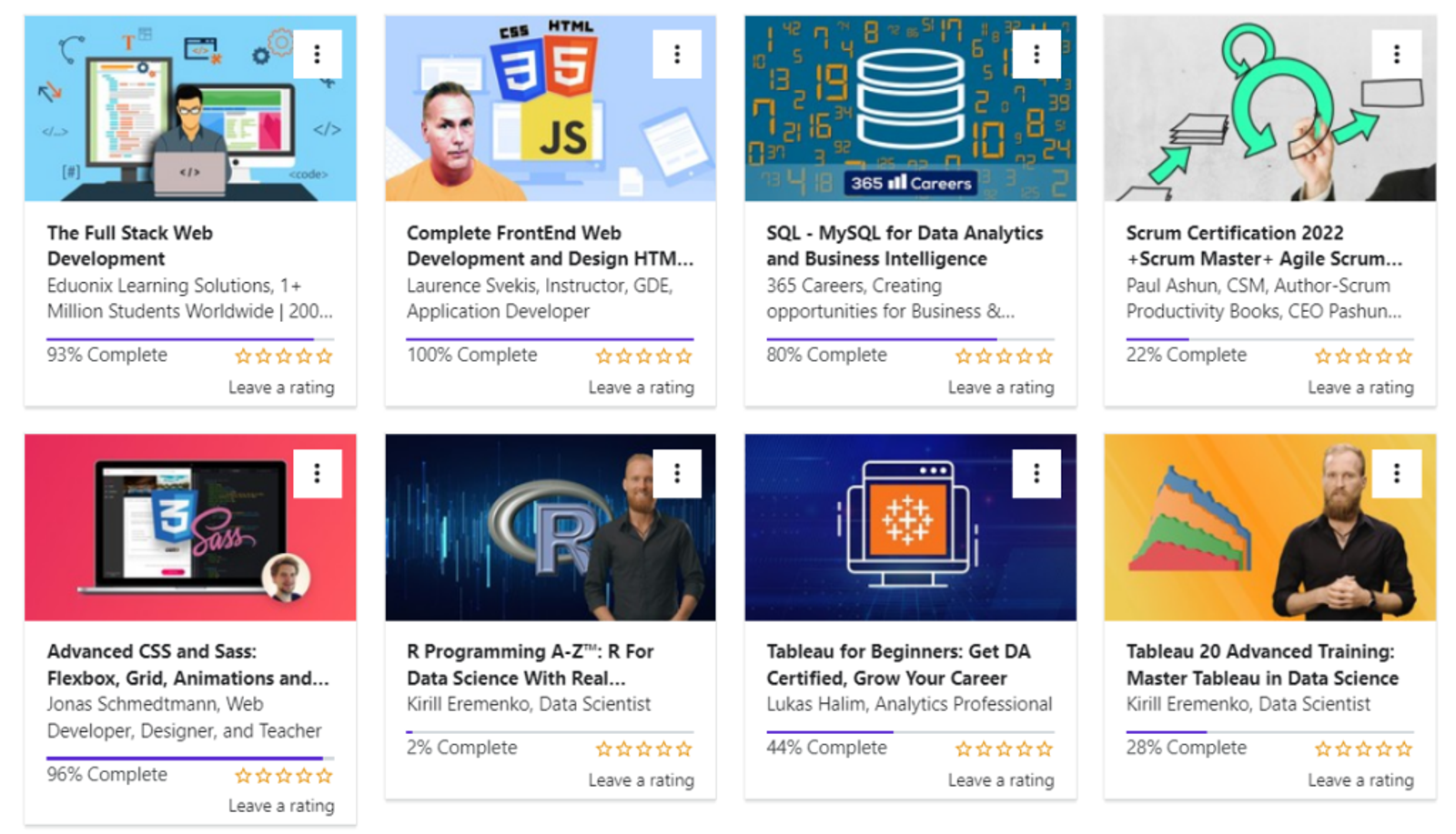
Udemy aims to democratize education by allowing learners to access courses at their own pace and often at affordable prices.
Pros of Udemy:
• Vast selection of courses across numerous topics
• Affordable pricing with frequent discounts and promotions
• Lifetime access to purchased courses
• User-friendly interface and accessibility across devices
• Opportunity for instructors to earn revenue through course sales
Cons of Udemy:
• Variable course quality and instructor expertise
• Limited interaction with instructors and other students
• Courses may lack depth or structure compared to academic programs
• Certificates may not be universally recognized
• Prices can vary widely depending on course popularity and demand
How much does Udemy cost for students?
Udemy offers a flexible pricing model for students, with many courses available for as low as $9.99 during promotional periods. Students can purchase courses individually, with prices typically ranging from $19.99 to $199.99 depending on the course content and duration.
Udemy also provides a 30-day money-back guarantee to ensure student satisfaction, making it accessible for learners seeking affordable and diverse educational opportunities.
How much does Udemy cost for course creators?
For course creators, Udemy operates on a revenue-sharing model where instructors receive 50% of the net revenue from course sales, or 97% if students enroll through the instructor's promotional efforts. There are no upfront costs for creating and publishing courses on Udemy, making it a low-risk option for educators to monetize their expertise.
Udemy provides tools and support for course creation, marketing, and student engagement, enabling instructors to reach a global audience and generate passive income from their courses over time.
Skillshare
Skillshare is an online learning platform that offers thousands of creative and practical courses taught by experts in various fields. It focuses on creative skills such as design, photography, and writing, as well as practical skills like business and technology.
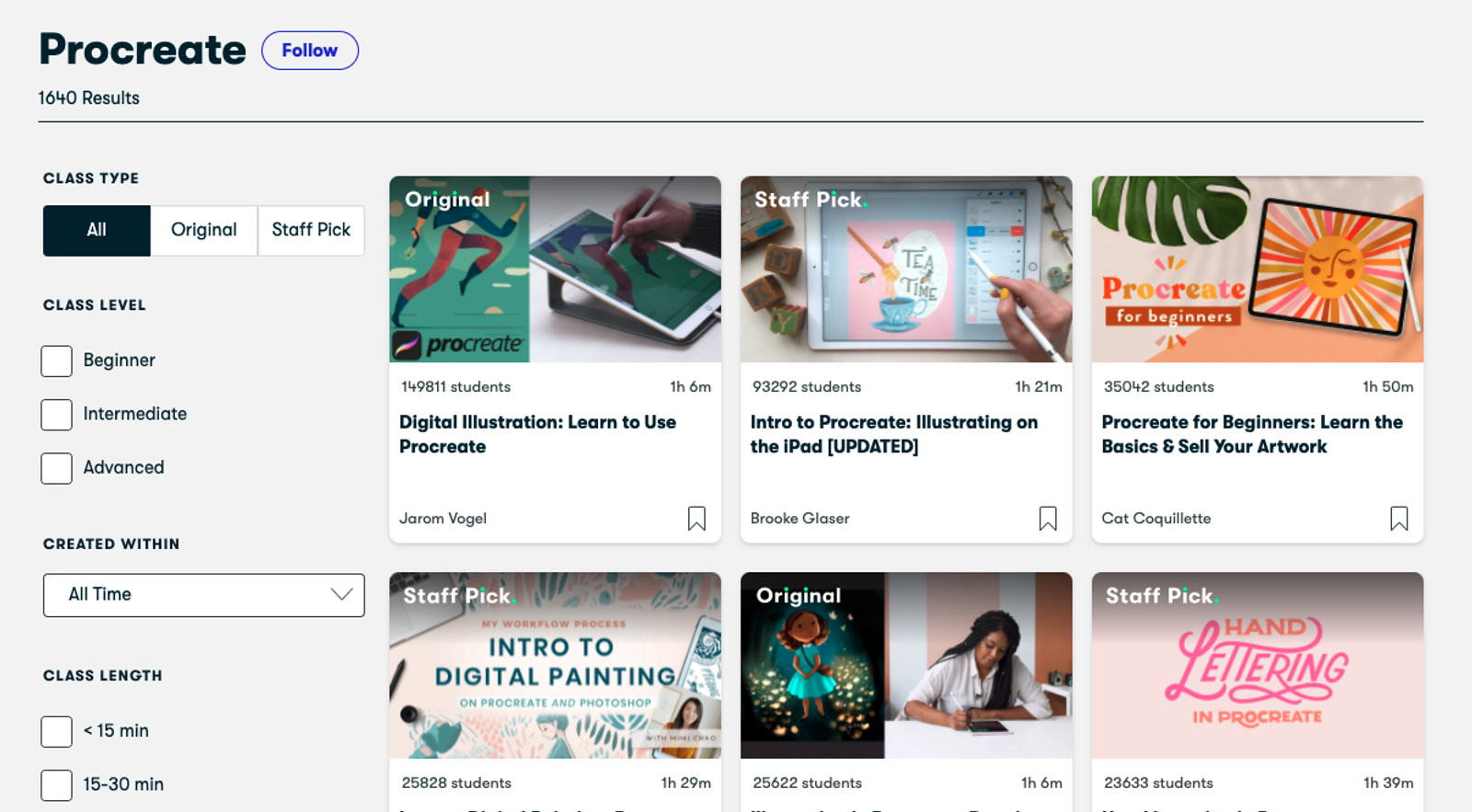
Skillshare provides a subscription-based model where members have unlimited access to all courses, fostering continuous learning and creativity.
Pros of Skillshare:
• Wide variety of creative and practical courses
• Subscription-based model with unlimited access to all content
• Community-driven platform with opportunities for collaboration and feedback
• User-friendly interface and mobile accessibility
• Affordable pricing compared to individual course purchases
Cons of Skillshare:
• Focuses primarily on creative skills, with fewer options for technical or academic subjects
• Variable course quality and instructor expertise
• Limited interaction with instructors and peers compared to other platforms
• No certificates or formal accreditation for course completion
• Some courses may lack depth or advanced content
How much does Skillshare cost for students?
Skillshare operates on a subscription model, offering a free trial period followed by a monthly or annual subscription fee. The Premium membership, which provides unlimited access to all courses and features, costs $19 per month when billed monthly or $99 per year when billed annually. This pricing structure allows students to explore a wide range of courses without additional costs, making it cost-effective for those interested in ongoing learning and skill development.
How much does Skillshare cost for course creators?
Course creators on Skillshare earn revenue through the Skillshare Royalty Pool, which distributes a portion of the platform's monthly subscription revenue to instructors based on their share of total minutes watched. Additionally, instructors can earn referral bonuses for every new Premium member they bring to Skillshare.
There are no upfront costs for creating and publishing courses, and instructors gain exposure to Skillshare's large and diverse community of learners. This model incentivizes creators to produce engaging and popular courses while potentially generating passive income over time.
Kajabi
Kajabi is an all-in-one platform designed for creating, marketing, and selling online courses, memberships, and digital products. It offers tools for course creation, website building, email marketing, and sales funnels, catering to entrepreneurs, educators, and businesses looking to establish an online presence.
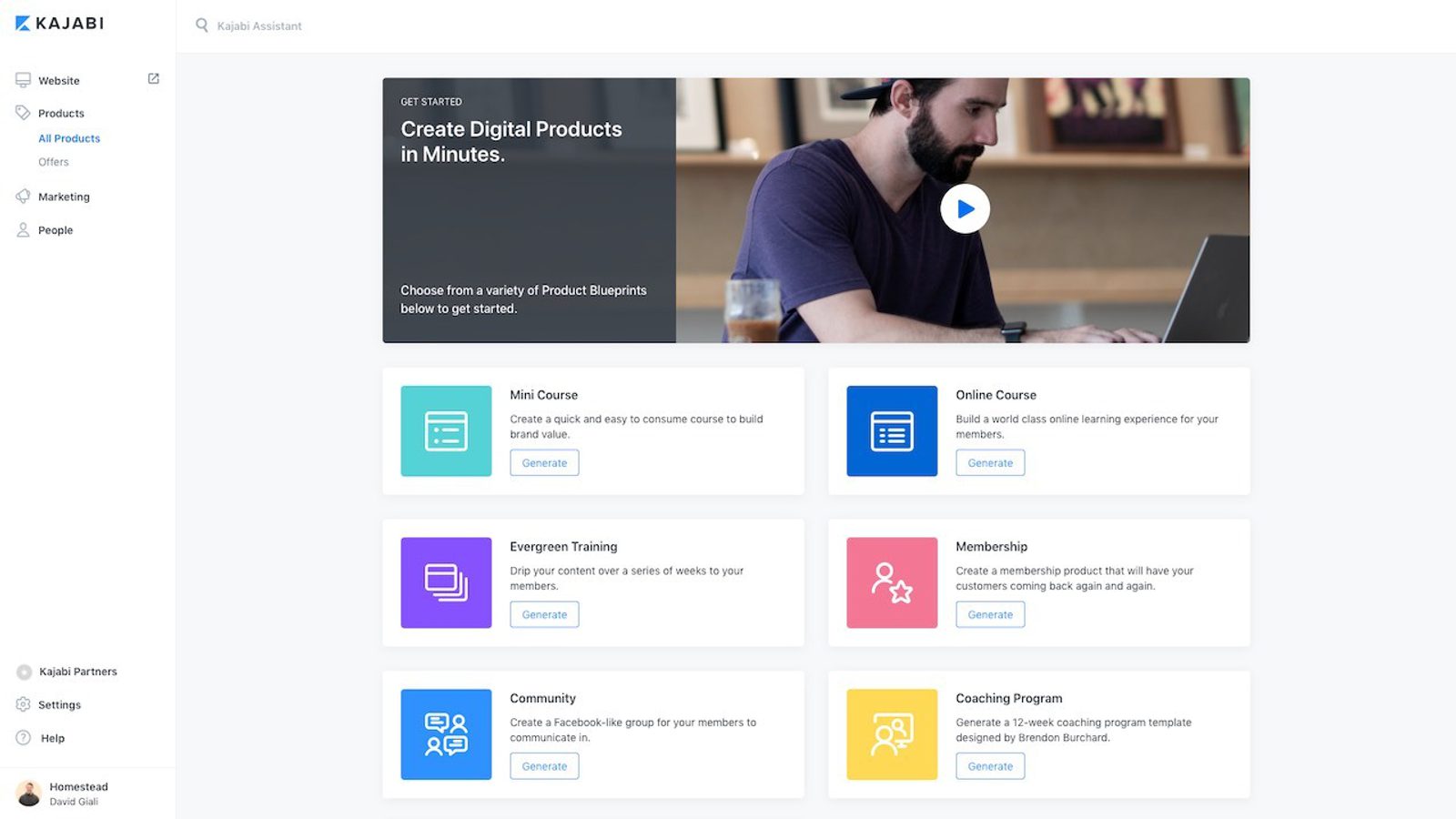
Kajabi aims to streamline the process of delivering digital content and engaging with customers through its integrated suite of marketing and educational tools.
Pros of Kajabi:
• Comprehensive platform with tools for course creation, website building, and marketing
• Customizable templates and themes for creating branded websites and landing pages
• Built-in email marketing and automation features to nurture leads and engage with students
• Ability to create memberships, digital products, and online courses all in one place
• Integration with third-party apps and services for enhanced functionality
Cons of Kajabi:
• Higher pricing compared to some other online learning platforms
• Learning curve for beginners due to the extensive features and customization options
• Transaction fees on sales for lower-tier plans
• Limited flexibility in design compared to standalone website builders
• Potential reliance on Kajabi's ecosystem for all digital marketing and sales needs
How much does Kajabi cost for students?
Kajabi primarily serves course creators rather than individual students seeking courses, so there is no specific entry-level pricing for learners. Students interested in courses on Kajabi would purchase them based on the pricing set by the creators, which can vary widely depending on the content and value provided by each course.
How much does Kajabi cost for course creators?
For course creators, Kajabi offers several pricing plans starting at $55 per month when billed annually for the Kickstarter plan. This plan includes features such as course creation, website building, email marketing, and basic analytics. Higher-tier plans, such as the Growth and Pro plans, offer additional benefits like advanced automation, affiliate management, and higher transaction limits.
Kajabi also charges transaction fees on sales for its lower-tier plans, which are waived for higher-tier plans, making it suitable for creators looking to scale their online course business while maximizing revenue.
Marketing automation and course creation
With the help of marketing automation software like ActiveCampaign, you can set up workflows that automatically send targeted messages based on subscriber behavior, ensuring that the right people get the right information at the right time. This continuous promotion keeps your courses visible and top-of-mind, helping you attract and retain students effortlessly.
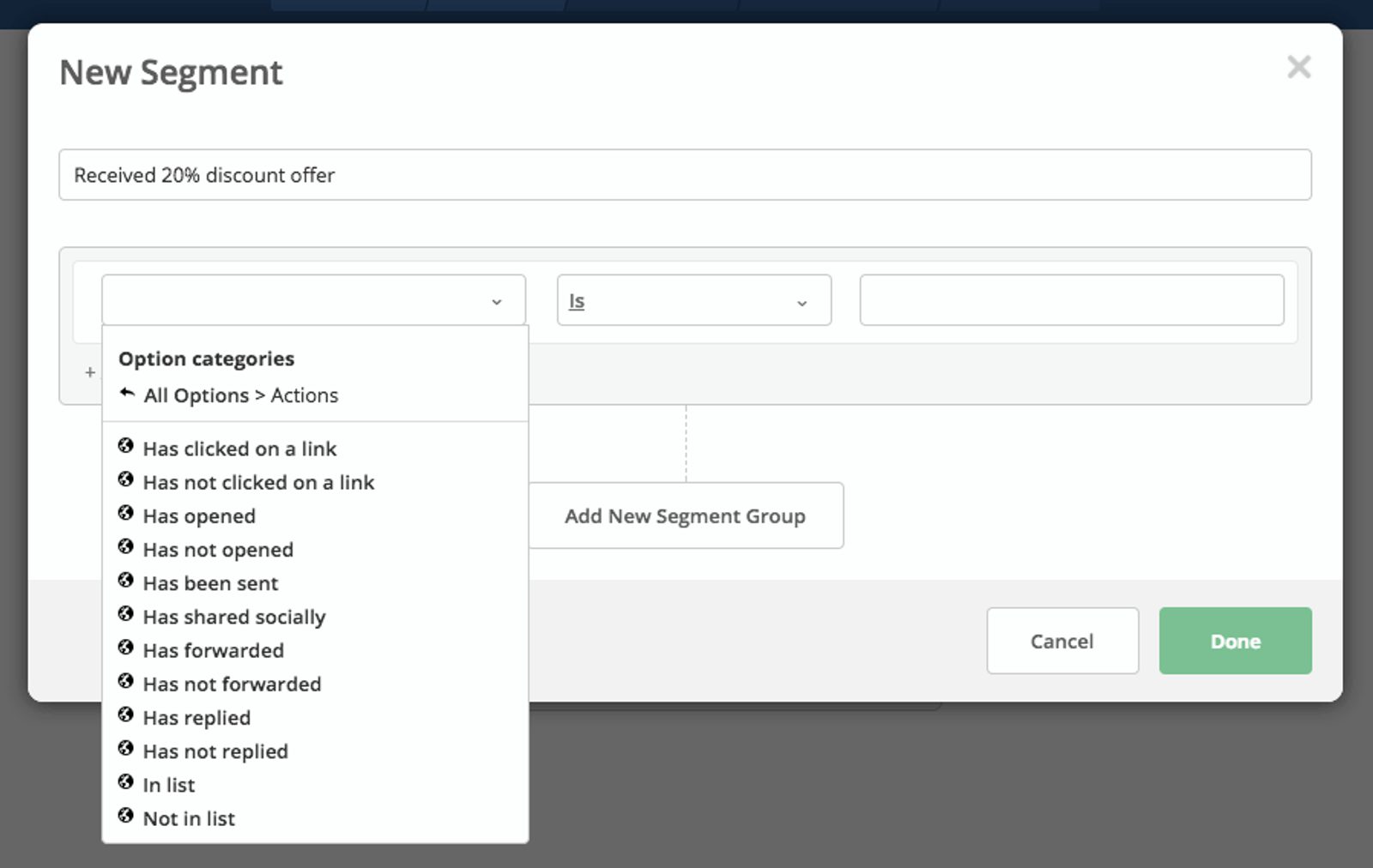
Plus, automate your online course by setting up welcome emails that make a great first impression. You can introduce new subscribers to your brand and what they can expect and send follow-ups or reminders to keep your audience engaged and informed about new content, upcoming courses, and special offers.
Click here to learn about how to use email automation in your online course marketing strategy.
Marketing automation software can help you nurture your students and create a truly phenomenal learning experience. Ready to pair it with the online learning platform of your choice?
Sign up for a free trial of ActiveCampaign today.



